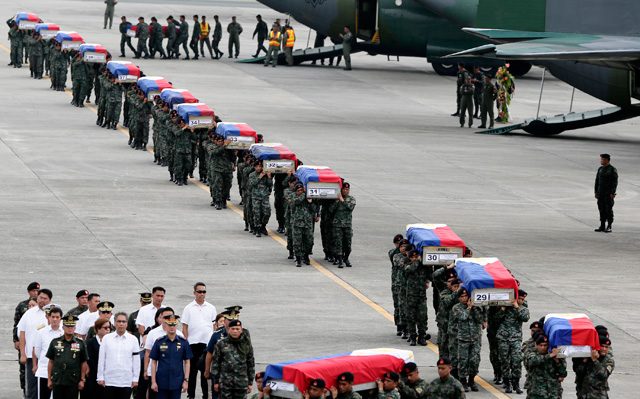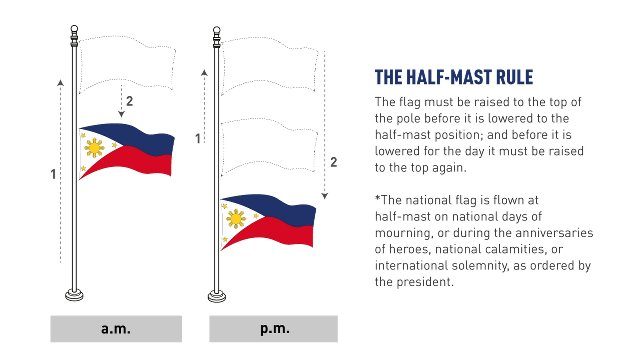SUMMARY
This is AI generated summarization, which may have errors. For context, always refer to the full article.

MANILA, Philippines – Malacañang declared Friday, January 30, a national day of mourning in honor of the 44 elite cops who died in clashes with Muslim rebels in Maguindanao.
The declaration was announced by President Benigno Aquino III in his speech on Wednesday, as he signed Proclamation 953 on the same day.
The proclamation states that this puts the nation “in solidarity with and joins in the grieving of the families and friends of our fallen brothers in the police force.”
It instructs “all public institutions and military installations in the Philippines to lower the Philippine flag to half-mast” on this day.
Based on the information provided in gov.ph, this is the 42nd time in the country’s history that a national day of mourning has been declared.
Under the Aquino administration, this is the 3rd time that a national day of mourning has been proclaimed. The other two are:
- August 25, 2010 – for the Luneta hostage crisis (happened on August 23)
- August 21, 2012 until funeral – for the death of former Interior and Local Government secretary Jesse Robredo (died in a plane crash on August 18)
Republic Act 8491 specifies that the Philippine flag shall be flown at half-mast “as a sign of mourning on all buildings and places where it is displayed.”

National days of mourning are usually declared after the death of a former politician, a national artist, or a recipient of national orders and decorations. The length of days when flags are at half-mast depends on the person being remembered:
| Official | Duration of Flag at Half-Mast |
| President or a former president | 10 days |
| The Vice-President, Chief Justice, Senate President, and House Speaker | 7 days |
| Cabinet Secretaries, Associate Justices of the Supreme Court, members of the Senate and House of Representatives, the Chief of Staff of the Armed Forces of the Philippines and the Director-General of the Philippine National Police, or in equivalent rank | 5 days |
| Heads of Government agencies, including Government Owned and Controlled Corporations (GOCC) and Government financial Institutions, or equivalent in rank | 3 days |
| The Commanding Generals of the Philippine Air Force and the Philippine Army and the Flag Officer in Command of the Philippine Navy, or in equivalent rank | 3 days |
| Governors, Vice-Governors, city and municipal Mayors, city and municipal Vice-Mayors | 3 days |
| Members of the Sangguniang Panlalawigan, Sangguniang Panlungsod and Sangguniang Bayan | Day of Interment |
| Veterans of the previous wars, Barangay Chairmen and the Barangay Councilmen | Day of Interment |
| Former National or Local Government Officials, appointed or elected, other than those specified above within their former respective territorial jurisdictions and by resolution of their respective Sanggunians | Day of Interment |
| Regional Directors, Superintendents, Supervisors, Principals, Teachers and other school officials, on the day of interment and by order of the proper school authorities concerned | Day of Interment |
| Recipients of National Orders and Decorations, on the day of interment and by the order of the President or the Congress | Day of Interment |
| Other persons to be determined by the National Historical Commission of the Philippines, including the former Vice-President, the Chief Justice of the Supreme Court, the President of the Senate and the Speaker of the House of Representatives | 7 days |
A national day of mourning could also be declared for other people or events. The January 30 day of mourning for the fallen elite cops is the third to be declared to commemorate victims of violence:
- In 2001, president Gloria Macapagal Arroyo declared September 16 a national day of solidarity against terrorism after the attacks in the US.
- In 2009, Arroyo declared November 26 a national day of mourning for the victims of the Maguindanao massacre.
A national day of mourning was also declared for other important public figures such as religious leaders:
- April 4, 2005 until funeral – for the death of Pope John Paul II
- September 7, 2009 – for the death of Iglesia ni Cristo’s Eraño Manalo
– Rappler.com
Add a comment
How does this make you feel?
There are no comments yet. Add your comment to start the conversation.